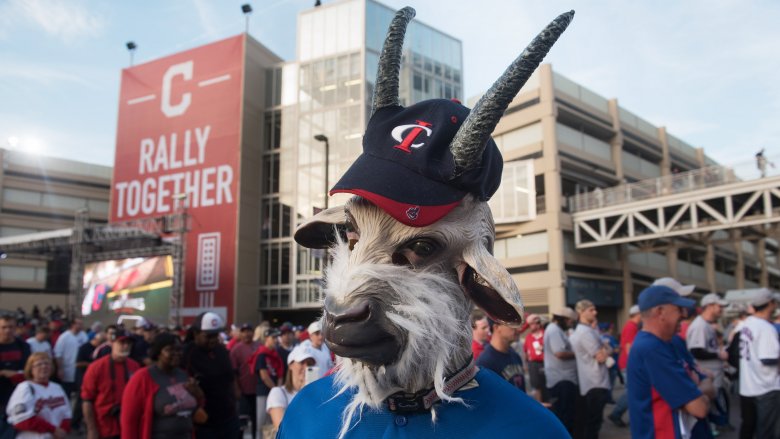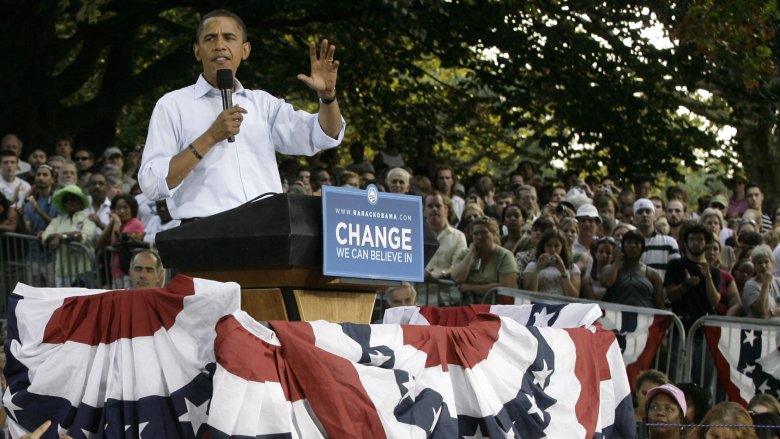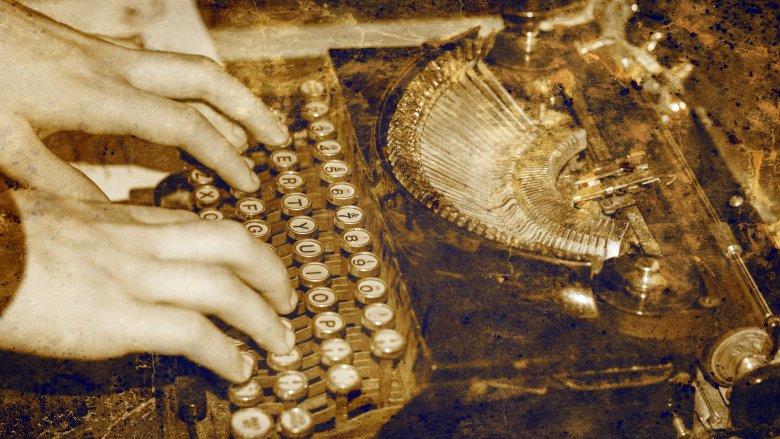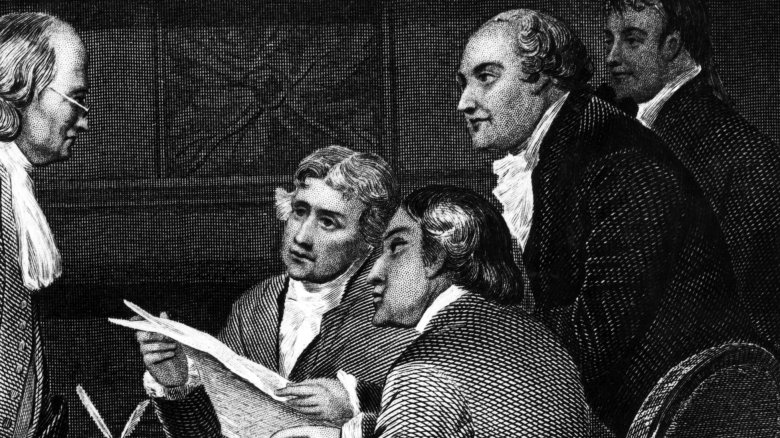Bizarre Coincidences Of Events Happening On The Same Day
We may receive a commission on purchases made from links.
Sometimes, coincidences just kind of ... happen, and don't really mean anything. Other times, they might be signs of a vast global conspiracy, a magic spell, or extraterrestrial surveillance, depending on who sees them. Either way, our little blue rock has seen many wild, wacky, and ominous coincidences happen on its surface ... particularly when it comes to calendar dates. We can't explain why these things happen — that's a question for the probability experts — but they certainly do happen, almost as if a novelist had planned it all from the start.
Before we get started, some ground rules: The bizarre coincidences listed below all share the same dates, but not always the same year. That means if your friend Teddy randomly gets hit in the head with an apple every March 29, it counts, but if he got hit on March 31 one year and April 15 the next, it doesn't. Got it? Let's go.
The Chicago Cubs finally win the Series on a very specific date
Go ahead, say that all this "bizarre coincidence" talk is just silly superstition. But if you want to see a really superstitious crowd, try to talking to baseball fans about the billy goat curse, as described by CBS Sports. The classic story is that in 1945, when the Chicago Cubs were in Game 4 of the World Series, a fan named William Sianis tried to attend the game with his pet goat. Well, apparently goats aren't allowed to be baseball fans because Sianis and his hoofed buddy were refused entry. As Sianis stormed off, he shouted that the Cubs would never again win the World Series.
Okay, so it sounds silly, but here's the thing: The Cubs already hadn't won a Series since 1908, and after Sianis and his goat "cursed" the Cubs, the team continued to struggle in the postseason. Sianis himself died on October 22, 1970, and as the 20th century rolled on, the Cubs kept losing, unable even to win a pennant to get to the World Series. Finally, in 2016, Chicago lit up with excitement as the Cubs won the pennant for the first time since Sianis' curse. Then they even went on to conquer the World Series, but here's the odd part. Guess what day they won the pennant? October 22, 2016. It's almost as if the goat planned it all.
Obama accepts his presidential nomination on the same date MLK gave his famous speech
On August 28, 1963, an estimated 250,000 people surrounded the Lincoln Memorial to join the legendary March on Washington, a truly massive event organized to shine a light on the massive racial inequalities facing the people of the United States. Of everything that happened that day, the one moment the history books will never forget is when a notable civil rights leader named Dr. Martin Luther King Jr. stood before the crowd and said the words, "I have a dream" (among a lot of other very good words).
Over half a century later, the United States still suffers from systemic racism, widening inequality, and prejudice. However, a symbolic advance was made in 2008 when a black Illinois senator named Barack Obama defeated the odds to become the Democratic candidate for president, an unprecedented achievement. According to the New York Times, the day the 2008 Democratic Convention ended — the day Obama accepted the nomination — coincidentally fell on the iconic date of August 28. Many media figures commented proudly on this bizarre coincidence, but the most important comment was made by Dr. King's daughter, Bernice King, who said a candidate like Obama being nominated was part of her father's dream because his selection was "decided not by the color of his skin, but the content of his character."
Two twins die in eerily similar ways
Twins are just bizarre if you think about it, and the many "coincidences" congregating around twins — even when they're separated at birth — are like something out of a science fiction novel. However, if anyone ever writes an encyclopedia recording odd twin incidents throughout history, the date of March 6, 2002, will stand out as one of the darkest.
On that day, according to the BBC, a 70-year-old man rode his bicycle down a stretch of highway in Raahe, Finland, when he was hit — and killed — by a passing truck. Just two hours later, before the family had been informed of the death, the man's twin brother rode his own bicycle across the exact same stretch of highway. Now, keep in mind, this second man probably had no idea his sibling was dead, much less where he'd died, so it's strange enough that he went to the same place. Even stranger, the bicycling twin was also killed in a truck accident, less than 2 kilometers from where his brother had been hit.
It's surreal coincidences like this one that make you wonder if there might be something to that whole "twin telepathy" concept, after all.
Double the Dennis, double the menace
North Americans are probably familiar with the character of Dennis the Menace, the innocent and adventurous little blond-haired kid with a dog named Ruff, whose well-intentioned efforts often tick off his cranky neighbor, Mr. Wilson. Dennis the Menace premiered in a March 12, 1951, comic strip by Hank Ketchum, according to Slate, and the character's misadventures in American newspapers grew popular enough that Dennis was spun off into TV shows, cartoons, and movies.
Well, here's the plot twist. Across the pond, also on March 12, 1951, a British creator named David Law published the first strips of a character named Dennis the Menace who had absolutely nothing to do with the American one. The British Dennis is also a kid, but with spiky black hair, an evil grin, a dog named Gnasher, and a more sadistic attitude that properly lives up to the "menace" label. Neither Ketchum nor Law had any idea of the other's creation, and both strips grew into separate cultural touchstones, despite having nothing to do with each other. Yeah, it's weird.
Love-hate relationship with Valentine's Day
Arvind Kejriwal probably loves being in politics. One might even say he hearts politics. In fact, the Indian politician's career has carried a strange connection to Valentine's Day for a few years now, according to the Hindu Business Line.
Kejriwal was first sworn in as the chief minister of Delhi at the end of 2013, but his tenure only a lasted 49 days, when his favored anti-corruption bill was blocked in the state assembly. Kejriwal stepped down from the position on February 14, 2014. However, his retirement was also short-lived: Within the year, he decided to run for the exact same position he had just relinquished. After defeating his opponent by a huge margin of 31,583 votes, the former chief minister was right back where he started. He was sworn in again on the date of — you guessed it — February 14, 2015. That's one whirlwind of a year.
A moonwalk and a Mars walk
Anyone who was alive (and conscious) on July 20, 1969, knows exactly where they were and who they were with as they watched Neil Armstrong become the first man on the Moon, and heard him utter that now-legendary statement concerning small steps and giant leaps. The Apollo 11 landing forever changed the course of human history and has inspired countless children to dream of becoming astronauts ever since.
But according to History, Apollo 11 wasn't the only important space vehicle to land on this date. A mere seven years later, on July 20, 1976, NASA's Viking 1 planetary probe landed on the surface of Mars, becoming the first spacecraft to ever successfully touch down on the red planet. While it's a shame the Viking 1 wasn't carrying astronauts — even now, unfortunately, humans only get to walk around on Mars in Doom games and Matt Damon movies — it's still pretty cool that Viking 1 landed on such an important date in space history.
Stranger than fiction
No list of great 20th-century authors would be complete without Aldous Huxley — the author of the all-too-prescient dystopian novel Brave New World — and C.S. Lewis, the man who wrote the epic fantasy series The Chronicles of Narnia. While both men possessed extremely different world views and writing styles, WGBH News points out that both of them died peacefully in their homes on the same day: November 22, 1963. November 22 claimed another major author in 1993, when Anthony Burgess — who wrote Brave New World's creepy dystopic sibling, A Clockwork Orange — passed away.
They weren't the only major figures to die on this date, of course. As a certain Stephen King novel reminds us, November 22, 1963, will forever be marked as the day President John F. Kennedy was assassinated. Though Kennedy wasn't a writer, the sheer coincidence of him, Lewis, and Huxley all dying on the same day prompted professor Peter Kreeft to write a book titled Between Heaven and Hell, which depicts all three men meeting in purgatory and debating philosophy.
Louis XVI had some problems with a certain time of the month
Okay, so we're going to break format here, but only a little bit. See, when it comes to Louis XVI, the last king of France, he had problems with a specific date. But rather than having to deal with annual coincidences, Louis instead had a slew of catastrophic events befall him on three different 21sts of their respective months, one after another.
According to Britannica, Louis' reign as king was thrown into disarray by both his "fundamental weakness of character" and a burgeoning revolution. This led him to attempt a desperate escape from the country in June 1791, but he didn't get far: He was caught on June 21, 1791. Louis' stress levels went from bad to worse about a year later, on September 21, 1792, when France's Legislative Assembly officially suspended his royal powers, took away his crown, and declared an end to the French monarchy. Louis' "21" problems finally concluded on January 21, 1793, when the 38-year-old disgraced king was executed by guillotine.
Founding Fathers, lost together
Today's Independence Day celebrations have become a nice excuse to blast fireworks, drink beer, and grill hot dogs, but we shouldn't forget these festivities happen for a reason: on July 4, 1776, the United States of America officially became its own nation. Of the "Founding Fathers" who were there that day, John Adams and Thomas Jefferson had one of the most interesting — and contentious — relationships in U.S. history. This makes it all the more bizarre that exactly 50 years after the first Independence Day, according to Politico, both men died of unrelated causes.
It's hard to express just how insane it is that, out of any members of that revolutionary gang, it'd be Adams and Jefferson who died on the same day. The two presidents went from friends to bitter enemies in the election of 1800, only to renew their friendship when old age brushed away the sting of past wounds. On July 4, 1826, the elderly Jefferson had planned on giving a 50th anniversary speech, but according to History, his health failed him and his story ended in his famed Virginia home, Monticello. Over in Massachusetts, John Adams passed away only five hours later, with his final words recorded as, "Thomas Jefferson survives."
U.S. presidents don't make a habit of dying on July 4, but the LA Times reports that James Madison also died on this coincidental date, albeit in 1836.
The genius scientist connection
When history books record the greatest minds of our generation, there's no doubt the top ranks will hold a place for Stephen Hawking, the oft-cited astrophysicist and author of A Brief History of Time. According to the BBC, Hawking was diagnosed with a rare form of motor neurone disease at 22 years old and only given a couple years to live, but against the odds, he lived all the way until 2018, finally dying at the relatively normal age 76.
According to USA Today, Hawking was born on January 8, 1942. That date is significant because it was the 300th anniversary of the death of Galileo Galilei, the astronomer whose discoveries regarding the heliocentric nature of the galaxy were immensely controversial at the time. Fast-forward to 2018 and Hawking died on March 14, which happens to have been the birth date of another famous theoretical physicist, Albert Einstein.
So, in a sense, one could sort of say Hawking began his life with death and ended it with birth. As if this wasn't enough, March 14 also happens to be "Pi Day," which is the annual celebration of the mathematical constant pi. You know, because March 14 = 3.14. Get it? Anyway, though Hawking himself would have probably written off this great spinning wheel of science as a totally bizarre coincidence, he almost certainly would have found it amusing.









